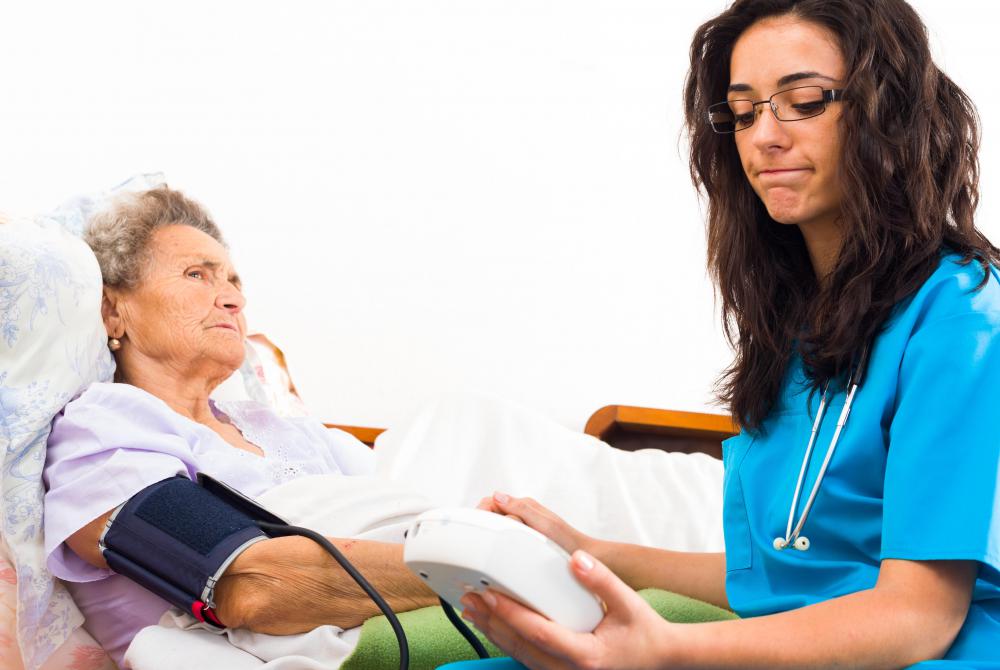At WiseGEEK, we're committed to delivering accurate, trustworthy information. Our expert-authored content is rigorously fact-checked and sourced from credible authorities. Discover how we uphold the highest standards in providing you with reliable knowledge.
What is a Health Information Technician?
A health information technician, also called a medical records technician, is responsible for managing medical records within healthcare settings. A medical record holds important information about a patient, including details of his or her insurance, diagnoses, and treatment. Ensuring these records are accurate and in order are vital duties in the health information technician role. A process called medical coding is typically one of the main duties.
Medical coding usually involves analyzing patient records and assigning the appropriate codes to each piece of diagnostic or treatment information. These codes are partly for the benefit of insurers, who need to determine the costs owed to the healthcare provider. The information from coding can also be used for research purposes, both inside and outside the healthcare setting. Some health information technicians may specialize in medical coding.

Cancer registry is another area where a health information technician can specialize. A vast amount of data on cancer patients is recorded over time, and this can be compared to offer insights into treatment approaches and preventive measures. Cancer registries from different healthcare organizations are sometimes combined and analyzed by specialist health information workers. Specializing in medical coding or cancer registry may not be possible without specific training.

Many different healthcare settings, such as hospitals, health centers, and nursing homes, all call for health information technicians. Pharmaceutical companies and law firms are examples of other workplaces that store patient data, and therefore may employ health information technicians. An office-based working environment is typical, and he or she will probably have his or her work overseen by senior office staff. There are sometimes opportunities to progress to senior health information roles.

A health information technician uses computers on a daily basis, and so must be computer savvy. Attention to detail, a commitment to patient confidentiality, and a willingness to work unsociable hours are also useful attributes in health information roles. Although health information technicians are unlikely to frequently interact with patients, communication skills are essential for exchanging information with other healthcare workers.

The qualifications required for health information posts vary depending on location and employer. In the US, some community colleges offer associate degree programs specifically aimed at those interested in health information careers. On completion of a Commission on Accreditation of Allied Health Education Programs (CAAHEP) accredited course, a candidate can choose to take an exam to be a Registered Health Information Technician (RHIT). The American Health Information Management Association can be contacted for more information.
AS FEATURED ON:
AS FEATURED ON:

















Discussion Comments
@the above questions: I am researching the field of health informatics, and just got accepted to Waterloo University (Canadian University- I live in Canada) for their Master of Health Informatics program.
From what I've read from several sources, it seems as if Health Informatics is a rapidly growing field of interest for many people, and therefore, many programs are being offered online now, so there are likely many other universities that offer a similar program.
Since it's a Masters program, there are conditions to meet the eligibility criteria, like holding an undergraduate four year degree in a health or health related profession and having completed some work experience in a healthcare setting.
In my case, I have an undergrad in social work, and worked in a hospital for two years, so this seemed to meet the criteria for Waterloo U. There are also undergraduate degrees in Health Informatics, but I haven't come across any of those that are offered completely online as of yet.
I think the field "Health Informatics" includes jobs/titles like "health information technician" and "health information analysts" etc. but not entirely sure. In Waterloo's Masters program, there are two streams you can enter into within the program. They are computer science and public health, so I suppose certain jobs within the field call for more of a computer science or engineering focused person which would be more suitable for a really "techie" job like software development and the actual designing of programs.
On the other hand, a public health focused person might be better suited to the research and networking jobs to help gather the information needed to determine the needs of an organization, etc. I am still trying to find out more!
Does anyone know of any online health information technician schools?
I am really busy and it would be much more convenient for me to take online classes. I am very interested in this field and would loved to train for it.
I have been looking into becoming a medical assistant, but it really seems like a lot of work, which is kind of giving me second thoughts. I mean, from what I've read it sounds like I would not only have to maintain medical records as part of the job, but also manage the records just like a health information technician. I'm still really interested, but if I'm going to be doing a lot of the same work as a health information technician, do you think it would be better for me to just train for that rather than as a medical assistant?
Post your comments